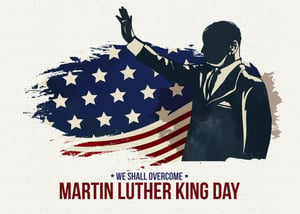On Monday, January 17 – 54 years after his death, we mark the 36th observance of the federal holiday in honor of Dr. Martin Luther King Jr.
As the most famous and inspirational leader of the seminal civil rights, social justice, and human rights movement in our nation’s history; Dr. King’s paramount role was as a champion of equality – and equity.
On Monday, January 17 – 54 years after his death, we mark the 36th observance of the federal holiday in honor of Dr. Martin Luther King Jr.
As the most famous and inspirational leader of the seminal civil rights, social justice, and human rights movement in our nation’s history; Dr. King’s paramount role was as a champion of equality – and equity.
He once said, “A dream of equality, of opportunity, of privilege and property, widely distributed; a dream of a land where men will not take necessities from the many to give luxuries to the few.”
The vision Dr. King was describing then is what we today call “equity.”
Often misconstrued: Equality refers to scenarios in which all segments of society have the same levels of opportunity and support. While, Equity extends the concept of equality to include providing varying levels of support based on individual need or ability.
In the more than a half-century since Dr. King walked among his fellow citizens, America still not only finds it difficult to accurately define Equality and Equity, but is most certainly challenged to implement the meaning of each.
For the vast majority, Dr. King’s image is frozen in time on the steps of the Lincoln Memorial from where on August 28, 1963, he delivered his “I Had a Dream” speech, leaving an indelible mark on history. Yet, to confine this great man’s legacy to a single moment in time, minimizes the progression of Dr. King’s intellectual and philosophical growth.
After spending more than a decade seeking to dismantle segregation, Dr. King was working to make the “Dream” come to fruition. By 1968, he had turned his focus to economic and equitable justice, with his organizing of the Poor People's Campaign to advocate for underprivileged Americans of diverse races.
It was his commitment to this effort that took Dr. King to Memphis, Tennessee in April of 1968, to support sanitation workers in the city who were on strike for better working conditions and higher pay -- a cause that was well aligned to Dr. King’s priorities at the time.
His speech on the evening of April 3 to an assembly of 25,000 people, took place in a Masonic Temple, since there was no church in the area large enough to accommodate the expected crowd. Not a single person in attendance realized that they would hear Dr. King’s prophetic “I’ve Been to the Mountaintop” speech – the last that he would ever deliver.
Yet, contained within these same remarks, Dr. King called upon his audience, and all Americans, to strive for a nation in which equity, equality, and justice are not just aspirations written on a piece of paper – but the foundations of the nation, with the following words:
“Let us rise up tonight with a greater readiness. Let us stand with a greater determination. And let us move on in these powerful days, these days of challenge to make America what it ought to be. We have an opportunity to make America a better nation.”
As an organization, the guiding purpose behind all of EdisonLearning’s work is to ensure equitable access and opportunity for each and every learner. The same holds true for each of as citizens. For without equity, inequality will persist and those among us who are most vulnerable will remain or become even more vulnerable.
At a time when everything around us seems to be a challenge, we should embrace the optimism of Dr. King’s “Dream” that by bonding and striving together, we can create a better society.


COMMENTS